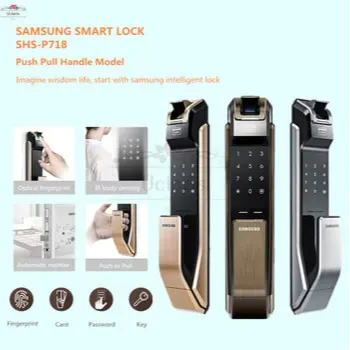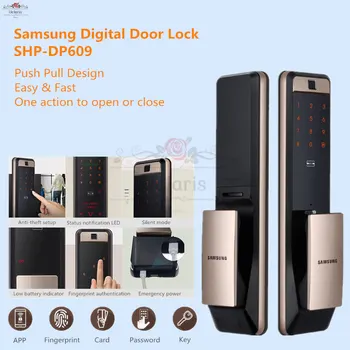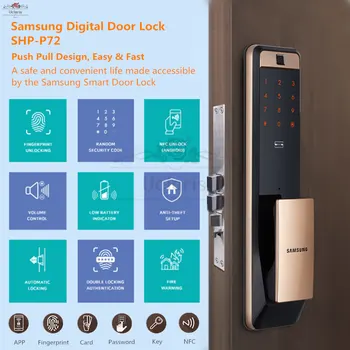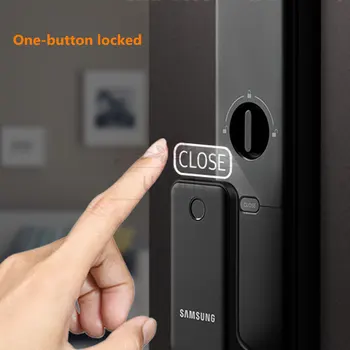



Samsung digital locks are electronic devices that are used to secure doors and control access to buildings, rooms or any other place that requires security. These locks work with fingerprint recognition technology, access codes, or even a mobile application. Some models of Samsung digital locks include:
These digital locks offer greater security and convenience, as they allow for remote access control and monitoring through a mobile application. Additionally, some models also allow for programming and managing access permissions for different users.
Digital locks are a secure and convenient alternative to traditional key locks. Some of the advantages of using digital locks include:
Digital locks work by using numeric codes or chip cards to open them instead of physical keys. The user enters a code or passes a card near a reader, and if the code or card information matches authorized records, the lock opens. Some digital locks also have wireless connectivity, allowing access to be controlled and monitored remotely.




Digital locks are security devices that allow access to a door or lock using a code, card, or electronic key. There are various types of digital locks, each with its own characteristics and benefits. Below, we describe the most common types of digital locks.
Combination locks are security devices that allow access to a door or lock by entering a numerical code. These locks have been used for decades in a variety of settings, from gym lockers to safes, and are a popular option for those looking for a secure and easy-to-use lock without having to worry about carrying a key or electronic card. On this page, we will discuss how combination locks work, the different types of combination locks, and their advantages and disadvantages.
Card locks use electronic cards to allow access. Electronic cards are similar to credit cards and contain encoded information that the lock can read. Card locks are commonly used in hotels and other commercial buildings.
Biometric locks are digital locks that open by reading a person's unique physical characteristics, such as fingerprints, facial scanning, or iris reading. They are highly secure and offer the advantage of not having to remember codes or carry electronic cards. Biometric locks are commonly used in government buildings and high-security facilities.
Electronic key locks use an electronic key to allow access. Electronic keys contain encoded information that the lock can read to allow access. They are ideal for those who want the convenience of not having to remember a code or carry an electronic card but still want a secure lock.
Digital locks offer several advantages over traditional locks, such as ease of use, enhanced security, and the ability to control access.
Before installing a digital lock, it is important to select the appropriate type for your door.
Some reasons why it is important to maintain digital locks are:
Many digital locks are compatible with home automation systems, meaning they can be integrated with other smart devices in your home. Some factors to consider when determining the compatibility of a digital lock are:
In general, digital locks for homes are usually compatible with most doors. However, it is important to verify compatibility before purchasing a digital lock to ensure it works correctly on your specific door.
The price of a digital lock can vary depending on the type of lock and its features. It is important to research before buying a digital lock. The price of a digital lock can vary significantly depending on the model, brand, and features of the lock. In general, digital locks can cost from a few hundred dollars to several thousand dollars.
The most basic digital locks, with simple functions such as opening with a numeric code or proximity card, can cost around $100 to $300. These locks are ideal for apartments or small homes that require basic protection.
On the other hand, high-security digital locks with advanced features such as intruder detection and Wi-Fi connectivity can be more expensive. These locks are ideal for homes with high security needs or businesses that need to protect valuable assets.
It is important to note that in addition to the cost of the digital lock, there may also be additional costs such as installation and maintenance of the lock. It is recommended to compare different models and brands of digital locks before making a purchase decision.
There are several popular brands and models of digital locks on the market, such as August Smart Lock, Schlage Encode, and Yale Real Living. It is important to research and compare different brands and models before making a purchase decision.
It is important to consider factors such as the level of security you need, ease of use, compatibility with other devices, and price before choosing a digital lock. Making a list of the features you need can help you choose the right lock for you.
